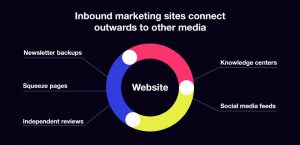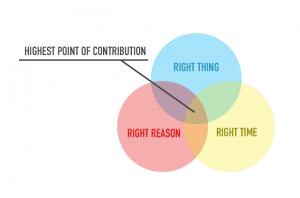— February 3, 2018

3844328 / Pixabay
Well-written – but not so compelling – content won’t generate the user signals needed to improve branded search results. A great brand story improves click-rates, increases dwell time, reduces bounce rate, helps branded content rank better in search results, and lowers the cost of promoting online content because it gets people to do much of the work.
When a client comes to our firm and asks us to simply “improve my search results” we usually respond with a question: “With what?”. It’s not just a matter of placing a lot of content in search results, it’s about crafting a story about the brand that people care about and respond to. The content itself is secondary to the story.
A good story beats perfect punctuation
Everyone knows that content should be well-written, right? Maybe not. A poorly written story about something you just can’t stop reading will perform better in search results. The U.S. Department of Education’s says that about 93 million Americans have basic or below basic reading skills – that’s about 43%. According to the National Literary Trust, “Around 15 per cent, or 5.1 million adults in England, can be described as “functionally illiterate”.
Well-written content is great, but a compelling story is more important for SEO and ORM because the user signals needed to improve branded search results like click-rates, dwell time, low bounce rate, and more helps branded content rank better. This lowers the cost of promoting online content because it gets people to do much of the work for you.
Does this mean good writing should be sidelined for a great story? No, but it does support a case that storytellers have more value than many think.
A good story is more cost-effective
The intent of every good reputation PR campaign is to improve the visibility of positive branded content. While it is often possible to use brute-force online reputation management (ORM) practices to promote existing positive content, it is far more cost-effective to let the users of Google and other search engines do the work for you.
By generating positive online content users want to click on, explore, and consume, many of the indicators Google uses to rank search relevance happen naturally. While ORM techniques like SEO and social media management are almost always necessary to promote the content, the resources needed are far lower, the results manifest more quickly, and they tend to “stick” better.
Brands benefit the most
Higher profile brands benefit from an improved story more than less well-known brands. This is in part due to a few factors higher profile brands experience that include:
- Greater search volume for well-known brands
- Higher churn rate of stories
- Negative content is often on high authority sites
When we talk about a “story”, we’re not just talking about one article to get it ranked well. We’re talking about the whole story of the brand as reflected in branded search results. At Reputation X we call it the “brand mythology”. It is a positive, honest view of an online brand as told via search and social media results. A single article, video, or blog post is merely one piece of the overall content plan.
A thoughtfully created story is coercive in nature. It must often compete with negative online content. One aspect of human psychology is called “negativity bias” which is the tendency for people to gravitate to negative content. In search engine terms this means that people will tend to click and consume negative content more easily than positive content. Therefore, to compete, positive content needs to be not only top notch, but placed on authoritative publications.
Authority publications outrank others
All things being equal, a site like the New York Times or Telegraph.co.uk will outrank a lesser known onine publication. They tend to work like this in search:
- Same story in two publications = more authoritative pub. will win
- Same story in two equally authoritative pubs w/ different headlines = More compelling headline will win
This is the reason why, when performing online reputation PR for better known brands, the creation of a compelling and well-crafted story, as well as placement of that story on a publication that is topically relevant and authoritative is important. The combination lays the groundwork for a strong ORM campaign to push negative online content down, and positive up.
“Genetically modified” headlines win
So far we’ve discussed the need to create an “impossible not to consume” story, and the need to place that story on a topically relevant website that Google or other search engines respect. These measures help an ORM project succeed. But there is another important aspect that should be taken into account: compelling headlines.
What are clickbait headlines?
Compelling headlines are sometimes called “clickbait” headlines because they are “genetically modified” to make them as irresistible as possible. Clickbait headlines are designed to exploit an aspect of the mind called the “curiosity gap” by providing just enough information to cause enough missing information to compel the user to find out more by clicking on the headline. These headlines show up in search results, every time they are clicked Google counts it as a vote of confidence toward the underlying web content. The more votes, the higher the search result moves up.
Summary
Want to lower the cost of online reputation campaigns? Spend extra time and resources on a compelling story for your brand. The payoff will be:
- More organic clicks
- Better on-page dwell time
- Reduced bounce rate
- Less need for SEO
- Branded content that will help SEO and ORM campaigns
Business & Finance Articles on Business 2 Community
(79)






